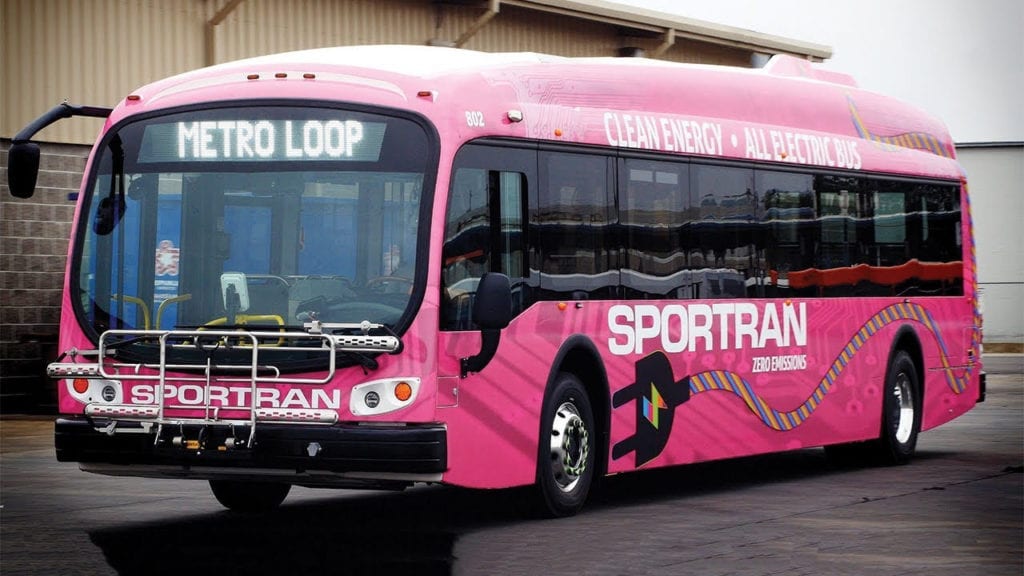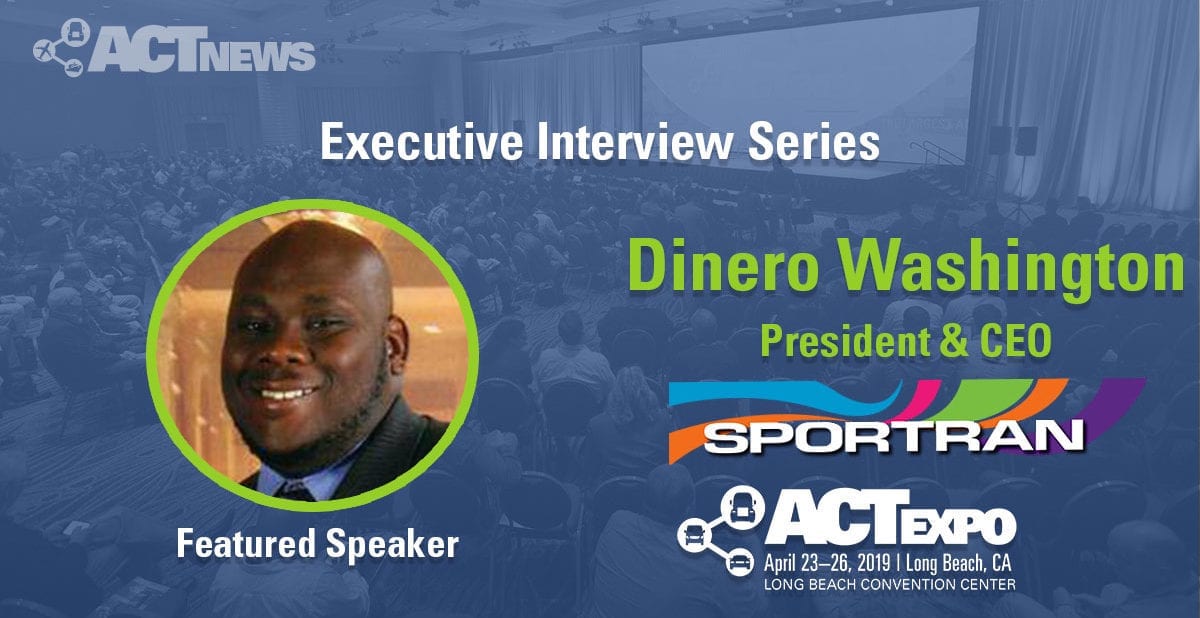An ACT News Executive Interview with Dinero Washington, President & CEO of SporTran, on their efforts to create a new transit experience with sustainable fleet operations Louisiana
As President and CEO of SporTran, Dinero Washington must balance both reducing fuel costs in a tax-supported agency and meeting greenhouse gas reduction targets while also prioritizing ridership and clean air for the citizens of Shreveport, Louisiana. Dinero has led pioneering efforts to implement alternative fueled vehicles and advanced technologies across their fleet operations—setting a public transportation first for the state of Louisiana.
Dinero will be joining a panel of industry experts discussing the benefits of advanced technologies and alternative fuels for smaller fleets in an upcoming workshop A Small and Mighty Fleet at ACT Expo.
ACT News caught up with Dinero to learn more about how he determines which alternative fueled vehicles will best suit the needs of the community and how his agency has been able to utilize grants to spur investment in their fleet operations and revitalizing the larger community.
ACT NEWS: You are leading innovative and sustainable fleet operations at SporTran, the first public transportation fleet in Louisiana to purchase battery electric transit buses. What is the compelling case for EVs in public transportation, and what are the challenges?
Dinero Washington: Adding electric buses to our fleet to complement our compressed natural gas vehicles was a carefully weighed decision at SporTran. But in the end, it was a no-brainer—go with the fuel source that will promote clean air while saving taxpayers millions in fuel costs over a 12-year period.
To that end, we evaluated many technologies, including “clean diesel,” which didn’t offer significant greenhouse gas or fuel-cost reduction for us. This isn’t something we take lightly. As a taxpayer-supported agency, it’s contingent on us to examine every option we have and to balance cost-effectiveness with other factors such as service, quality, and environmental impact.
As a taxpayer-supported agency, it’s contingent on us to examine every option we have and to balance cost-effectiveness with other factors such as service, quality, and environmental impact.
ACT NEWS: You are speaking at ACT Expo, April 23, on the panel “A Small and Mighty Fleet” which will explore the benefits of advanced technologies and alternative fuels for smaller fleets. What led SporTran in 2010 to begin replacing older diesel buses with CNG buses, and how do you plan to keep incorporating advanced technologies and alternative fuels in the future?
Dinero Washington: SporTran will hopefully soon introduce cutting edge technology that will eventually make public transit more cost effective and financially sustainable. If grants are approved by USDOT, Our Common Link Project will be implemented in phases over a three-year period, with the ultimate goal of putting electric autonomous buses on one of our existing, high ridership bus routes by the end of the demonstration period. Our project will launch on two new low-speed routes within the Shreveport central business district using the Level 4 High Automation EasyMile EZ10 shuttle. As the project progresses, we will make incremental changes to routes and vehicle speed, and we will introduce two larger capacity Level 4 automated battery-electric buses to demonstrate that ADS can be layered onto existing transit technology.
We have designed the demonstration routes in coordination with our technology partner, EasyMile, focusing on turns, traffic signals, speed limits, and traffic patterns to create routes that are safe, but will at the same time advance ADS technology. The first route will provide connectivity between our downtown business district, the Shreveport Common cultural district and urban park, and United States Department of Housing and Urban Development Choice Neighborhood construction in the Ledbetter Heights neighborhood. The second route will link the central business district, convention center, and downtown hotels with Shreveport’s riverfront entertainment district. The city’s $24.2 million Choice Neighborhood grant will have a massive economic impact for Shreveport and will transform the area in, and around, our demonstration site. The total investment is estimated at $140 Million, including both grant dollars and leveraged capital. This will generate an estimated $2.6 billion in economic impact and will create an estimated 2,500 direct, indirect, and induced jobs in construction, supportive services, community improvements, and administration.

ACT NEWS: What is your proudest moment at SporTran?
Dinero Washington: On November 11, 2017, our SporTran Family was able to do a ribbon cutting for three new transit facilities, five electric buses, and five charging stations in one day.
ACT NEWS: What is the best part about your role at SporTran?
Dinero Washington: The best part about my career is being able to make a positive impact on our citizens’ and employees’ lives daily and creating new opportunities for our future leaders.
ACT NEWS: What are your hopes for the clean transportation and energy industry?
Dinero Washington: My hope for clean transportation is an overhaul of local, state, and federal funding sources to allow a transit system to purchase additional clean technology, helping to eliminate pollution and greenhouse gas emissions as much as is technologically feasible.
The best part about my career is being able to make a positive impact on our citizens’ and employees’ lives daily and creating new opportunities for our future leaders.
ACT NEWS: What advice would you offer to young professionals interested in pursuing a similar career path?
Dinero Washington: Don’t be afraid to take initiative. Most employers like initiative. But make sure you understand whether they do or not. Some jobs are very confined in terms of what you are allowed to do. Others are not. Listen to other people. Learn from them. Figure out the lay of the land.
ACT NEWS: How do you define “success”?
Dinero Washington: I define success as delivering more than expected of my team and of me. For example— Our primary goal for the past year has been to offer a new transit experience to our customers. While the main force behind the delivery of our new customer service platform has been to increase ridership and reflect the wants of the citizen, I’ve also identified several internal processes to automate some of the ways we do things differently at SporTran. After consulting with our team, we were able to integrate 85% of our paper processes to electronic formats.
ACT NEWS: What did you want to be when you grow up?
Dinero Washington: I always wanted to be a doctor when I was growing up. Being a doctor sounded cool when I was young because you got to help others, but then I grew up and realized that becoming a doctor takes a lot of work, education, and time. Or maybe my interests simply changed and transportation caught my eye. Whatever the case, as an adult, I tended to be more realistic about my career choices and realized there are so many career paths that can equip you to help people.


